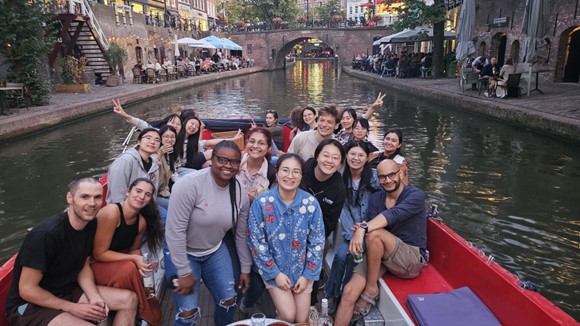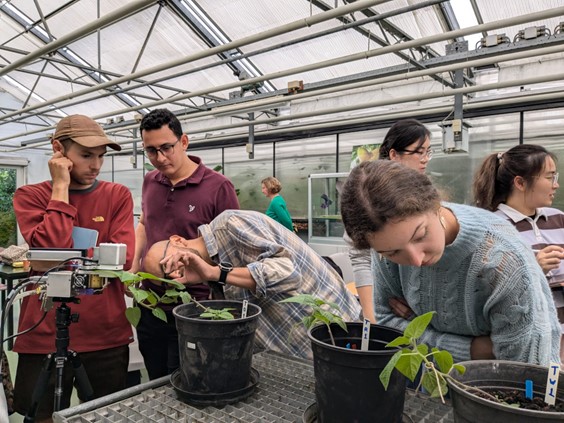The below article was written by Snehanjana Chatterjee, a PhD student at Texas Tech University. Read on for some of her highlights from the first LEMONTREE summer school and the thoughts of the other ECRs in attendance.
With the start of fall 2024, LEMONTREE hosted it’s Annual meeting and summer school at Utrecht University, Netherlands. I had the incredible opportunity to participate as a first-time attendee. The annual meeting, held from 26th-28th August, had all the working groups (C,N and P Cycles Synthesis, Leaf Area Dynamics and Carbon Allocation, Canopy Temperature, Fire-Vegetation Interactions, Ecohydrology, Vegetation Dynamics/Functional Diversity, Implementation) in attendance to update each other about their progress and insights.
Following the Annual meeting, LEMONTREE hosted its first summer school from 29th-31st August. It was designed uniquely to be taught by the early career researchers (ECRs) themselves; to share research methods they have mastered over the years, and to learn different skills from other ECRs.

Figure 1: ECRs enjoying a boat ride in one of the canals of Utrecht city centre.
Day by Day breakdown
Day 1- Theory Development– The first day was led by Prof. Colin Prentice (Imperial College, London), Dr. David Sandoval (Imperial College, London) and Zhang Han (Tsinghua University). After learning more about optimality theory, we learnt about soil moisture models and stem respiration, which provided us with some examples of applying this theory.
Day 2- Running the P model– Participants engaged in a lecture on “Running the P model” followed by hands on activity of using the P-model in R and PYrealm taught by Dr. David Orme (Imperial College London), Dr. Wenjia (Shirley) Cai (Imperial College London), and Francesco Grossi (University of Bern). This was a great opportunity for us (the students) to try running the P-model and to ask how we might apply it in our own research.
Day 3- Gas Exchange measurements– The ECRs practiced gas exchange measurements using both the Li-COR 6400 and Li-6800. This session was taught at the botanic gardens by Assoc. Prof. Hugo de Boer (Utrecht University), Jan Lankhorst (Utrecht University), Daniil Scheifes (Utrecht University and Zinny Ezekannagha (Texas Tech University). We learnt about the importance of understanding your data, how it is measured, and how long it takes the experimentalists to produce the data used in models!

Figure 2: ECRs learning how to record gas exchange measurements using a Li-COR 6400 under the guidance of Daniil Scheifes.
ECR Impressions
At the conclusion of the summer school, I interviewed a number of ECRs, asking about their impressions regarding LEMONTREE’s first summer school. Amin Hassan, a PhD student at the University of Pittsburgh (Ecohydrology working group) said, “As a student who has background in hydrology, not plant biology, it was nice to go through the basics of the P model, optimality theory and afterwards it’s application.”
Another PhD student, Ngoc Nguyen from UC, Berkeley enthusiastically stated, “The summer school approached ecosystem science in a very organized, multi-level and interdisciplinary way. We learned how to take measurements from leaf level to incorporating that into the P-model. I was connected to both the people and the material which helped me understand the theory behind the P-model. I also got inspiration from other ECRs like myself, and ideas on how to incorporate everything from theory to experiments in our own research”
Sophia Cain, one of the organizing members added, “It was interesting to see a lot of research and collaboration between the ECRs independent of the PIs. From a management perspective, it was nice to meet all the ECRs in person and I hope we all stay in touch.”
Jan Lankhorst, a PhD student at Utrecht University noted, “With the material provided this year, the ECRs from different disciplines can implement the models taught [at the summer school] with their own data and discuss the outcomes with the entire group.”
Overall, it is clear to see that the ECRs took a lot from observing the research process from data collection through to theory development and model prediction over the course of the three-day experience. Understanding one another’s research methodologies in more detail will help us to collaborate and discuss LEMONTREE research in the future.
The LEMONTREE Annual meeting and summer school successfully brought a diverse range of researchers from different countries together, fostering collaboration and knowledge exchange. As we move forward, I want to maintain these connections which will undoubtedly inspire innovative research in the future and give us an opportunity to learn from each other.
By Snehanjana Chatterjee
